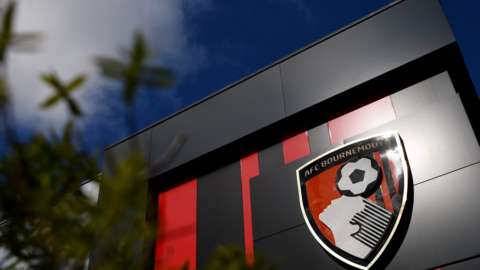Bournemouth: Bill Foley-led partnership completes takeover of club
A partnership led by American businessman Bill Foley has completed its takeover of Bournemouth.
Previous owner Maxim Demin has sold his 100% stake in the Cherries to Foley’s Black Knight Football Club.
Foley, the owner of NHL ice hockey franchise the Vegas Golden Knights, assumes the position of chairman.
In a statement, the club said Foley was “committed to providing the investment to sustain and build upon Bournemouth’s recent accomplishments”.
It is the latest American investment into the Premier League after a group led by Todd Boehly took over Chelsea in May.
Liverpool, Manchester United, Arsenal, Aston Villa, Crystal Palace, Fulham, Leeds, West Ham and Manchester City all also have US investment on some scale.
“I have tremendous respect for the passion and support the Bournemouth community shows for this club and believe that connection to the community is the foundation for success of any sports team,” said Foley, 77.
“We will move forward with an ‘always advance, never retreat’ approach that has defined all of my endeavours. I am committed to work with the best football and business minds available to enhance player development, facilities, and the fan experience to put AFC Bournemouth in the best possible position to succeed.”
Foley was in attendance at Bournemouth’s win over Leicester in October and will be at their next home match against Crystal Palace on 31 December.
He has already purchased a home in the Bournemouth area to “reaffirm his commitment” to the club and surrounding community.
Foley is chairman of Cannae Holdings Inc., which has a 50.1% interest in the club.
The minority ownership group is led by Hollywood actor Michael B. Jordan, in what is his first foray into professional sports ownership.
Former owner Demin leaves Bournemouth after 11 years in which he oversaw their rise from League One to the Premier League in less than five years.
The Cherries are currently 14th in the English top flight and resume their Premier League campaign after the World Cup break when they travel to Chelsea on 27 December.
“Without the belief and financial backing of Maxim and his family, AFC Bournemouth might well have ceased to exist,” said Foley.
“Maxim’s support and involvement has allowed the club to establish itself as a top-flight team.
“We’d like to thank him for his co-operation throughout the process and praise his hard work while owner of the club. We wish him well as he focusses on his other business endeavours.”
Analysis – a sizeable block of US interest
BBC Sport’s Simon Stone
On the face of it, it does seem strange Bill Foley is buying into the Premier League at a time when fellow US sports owners, Fenway Sports Group and the Glazer family, are thinking of getting out of Liverpool and Manchester United.
There is a significant difference. Liverpool and United already benefit from huge TV revenues and the door to further riches was closed when the European Super League idea was met by such fierce opposition.
Bournemouth’s aims are not as lofty. If they could be secured as a top-flight club, the value of the asset would increase. Buying them now indicates a belief on Foley’s part the ambition can be realised and also the already enormous income from the Premier League’s broadcasting contracts has not reached a ceiling.
Nevertheless, for Bournemouth, with by far the smallest stadium, which the club do not own, significant up-front costs to increase capacity and improve training facilities to meet Foley’s ambition of having a Category One academy, will have to be met.
And, bearing in mind the debt taken on by other US owners, including the Glazer family to buy United and, more recently, Alan Pace in his purchase of Burnley, Foley at some point will come under pressure to explain how, specifically, his deal has been financed.
For now, it brings the number of Premier League clubs with an element of US ownership to 10. It is still some way short of the 14 votes required to push through any types of reform but – if they were all of like mind – it does represent a sizeable block.



